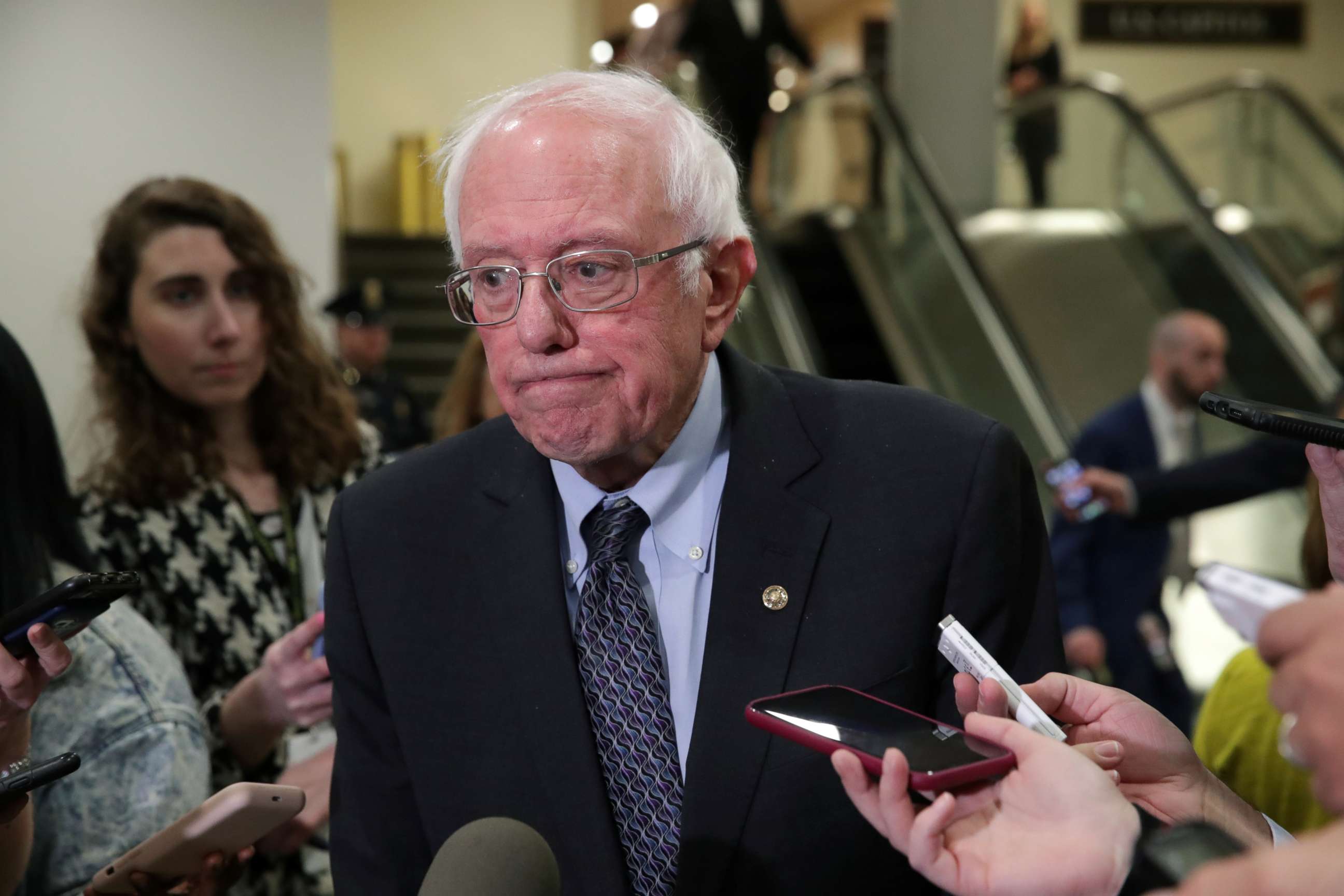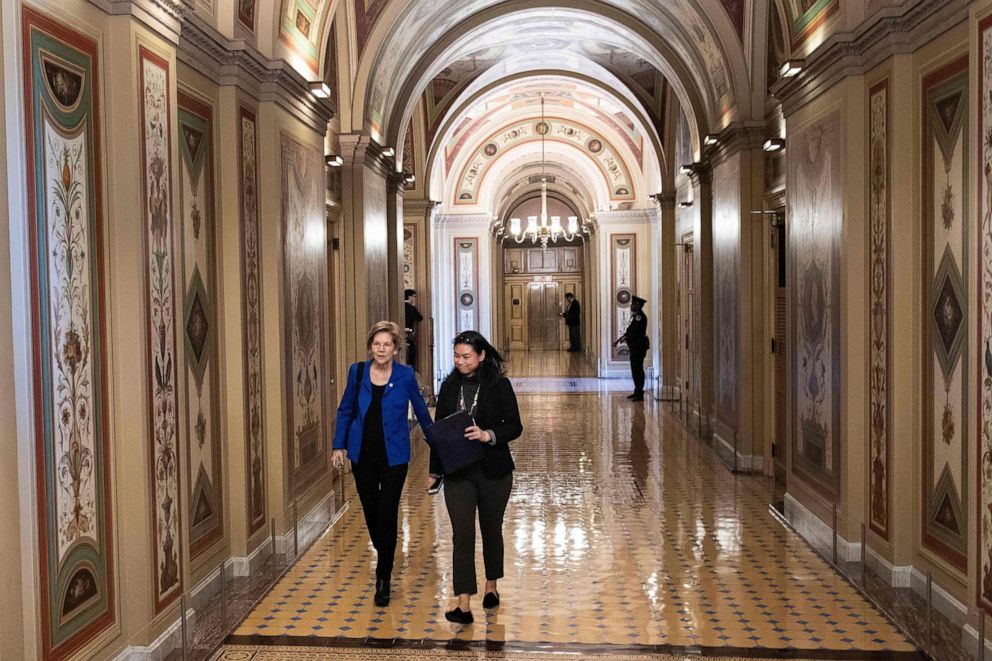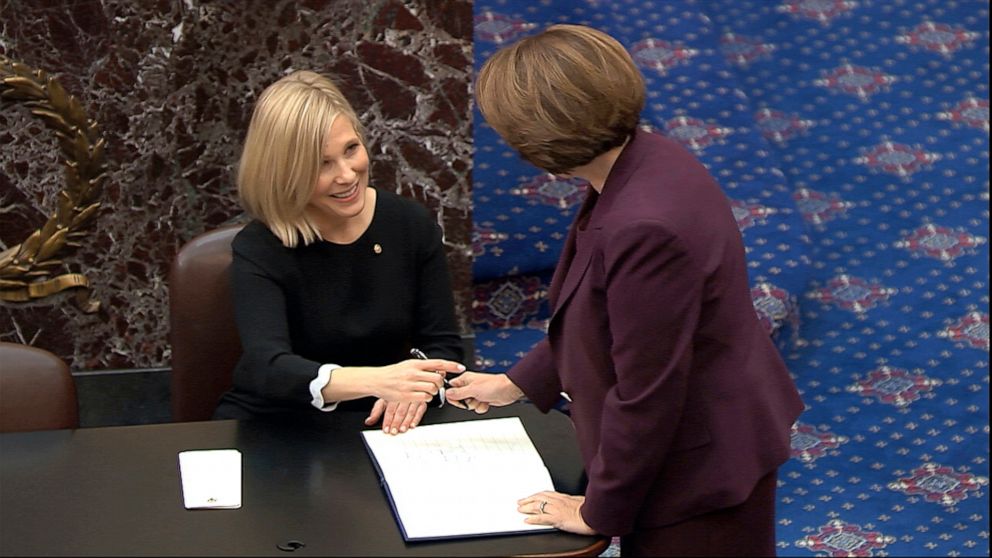Trump impeachment trial complicates 2020 Democrats' time on campaign trail
The Democratic senators running for president will be forced to stay in D.C
President Donald Trump’s Senate impeachment trial has scrambled the Democratic primary, forcing senators in the race to overhaul their schedules in the final stretch before the Iowa caucuses and New Hampshire primary.
At a time when presidential candidates traditionally camp out in early voting states, the four senators will spend their afternoons at their desks in the Senate chamber, sitting in silence for six days a week, listening to evidence and debating over whether Trump abused his power and obstructed Congress in efforts to investigate the Ukraine affair.
“I would rather be in Iowa today, there’s a caucus there in two and a half weeks,” Sen. Bernie Sanders, I-Vt., told reporters Thursday at the U.S. Capitol amid impeachment proceedings. “But I swore a constitutional oath as a United States senator to do my job.”

He is hosting a rally in Iowa Wednesday evening and his campaign has said he's willing to go back-and-forth to continue to squeeze in events during the trial.
Sen. Elizabeth Warren, D-Mass., who has made face-to-face campaigning and selfie lines a signature part of her campaign, is expected to supplement her time in Washington with virtual town halls, and plans to return to the trail when possible throughout January.
With a four-way race emerging between Warren, Sanders, former Vice President Joe Biden and South Bend Mayor Pete Buttigieg at the top of the field, the trial has obvious implications for the senators.
"It's a challenge. There's no doubt about it,” Matt Paul, a prominent Democratic strategist who led Hillary Clinton’s Iowa efforts in 2016, told ABC News. “From a campaign standpoint, it comes at a very difficult time for them.”
The race is still competitive and many voters haven’t settled behind a single candidate.
One recent poll of Iowans by Monmouth University showed Biden leading the pack, followed closely by Sanders, Buttigieg and Warren, while a CNN poll out days earlier showed Sanders in front, followed by Warren, Buttigieg and Biden. Both found that roughly 6 in 10 voters don’t have their minds firmly made up on a candidate.
President Trump and Republicans have hoped for a speedy trial that would conclude before the Feb. 4 State of the Union Address. But the push from Warren and other Democrats to seek additional witnesses and records could extend proceedings through Iowa and New Hampshire, and well into February.
“It is a tough time to be stuck in Washington,” said Howard Dean, a former Vermont governor and Democratic National Committee chair who ran for president in 2004 and came in third in the Iowa caucuses after being considered the front-runner. “And it’s going to be just as painful in New Hampshire and South Carolina as Iowa.”
“The fact that there are four [primaries] in a row and they can be taken out of all four primaries, that is some of concern,” he added.
Biden and Buttigieg will spend the next few weeks on the ground, engaging with local press and voters in churches, diners and town halls across Iowa, New Hampshire, South Carolina and Nevada.

Sanders and Warren will be forced to lean heavily on key campaign surrogates to spread their message and keep them on voters’ minds on a day-to-day basis.
“I told her, sign me up,” former presidential candidate Julian Castro, now a key Warren supporter, told ABC News’ Rachel Scott in Iowa about helping the senator’s campaign. “Every minute counts, and I’m going to do whatever I’m asked between now and the Iowa caucus.”
For Sen. Amy Klobuchar, D-Minn., who is staking her campaign on a strong performance in Iowa, and Sen. Michael Bennet, D-Colo., who is hoping to do the same in New Hampshire, the Senate trial could undermine plans for a late resurgence ahead of early voting.
“I’ve got to be there. At the same time, I’m going to get here. And I do things like get five hours sleep. I do things like I get on a plane like I did today at 6 a.m. I just keep going,” Klobuchar told ABC News’ Rachel Scott in Iowa last week.
“We're just going to have to adjust," she said. "We don't know what the schedule is going to be, but I just think we have to have as fair a trial as possible with the four witnesses that we've asked for, and the chips will fall where they may when they come to this campaign.”
In 2016, when Clinton narrowly defeated Sanders and his stronger-than-expected campaign in the caucuses, the former secretary of state was able to adjust her schedule and spend more time in Iowa when it became clear that the result could be close, according to Paul, her 2016 Iowa state director.
“We added events in Iowa, and added her time in Iowa, and, you know, that was critically important to winning in Iowa,” he said.
The rules of the impeachment trial, which force senators to sit in silence and submit written questions to Supreme Court Justice Roberts, will also limit the opportunities for Democrats to seize the spotlight, as Klobuchar and Sen. Kamala Harris of California did in the confirmation hearings for Supreme Court Chief Justice Brett Kavanaugh in 2018.

But Zac Petkanas, a Democratic strategist who served as Clinton’s rapid response director in 2016, argued that the historic nature of impeachment proceedings will play in the senators’ favor.
“All eyes are going to be on this impeachment hearing, especially amongst caucus-goers who are die-hard Democrats,” he said. “After the trial each day, they will be able to go on cable news and give their reactions and stay at the center of the conversation.”
The campaign operations, he added, won’t be dormant in the early voting states while the senators are on Capitol Hill.
“It’s not like them not being there means they’re going to vanish,” he said. “Candidates will be there every time they turn on the TV and radio.”
ABC News' Sasha Pezenik, Adam Kelsey and Beatrice Peterson contributed to this report.




